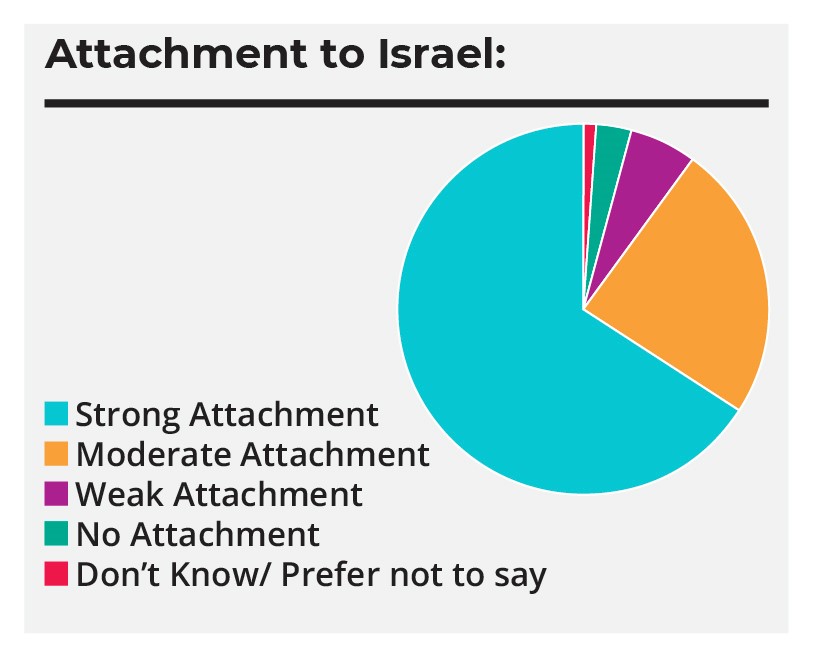click to dowload our latest edition
CLICK HERE TO SUBSCRIBE TO OUR NEWSLETTER


Published
4 years agoon
By
adminJORDAN MOSHE
That’s according to the research report, “The Jews of South Africa in 2019: identity, community, society, demography”, released last week.
But that doesn’t mean that the bond between South African Jewry and Israel isn’t meaningful and close. It’s very close. So much so that there is an increasing number of people interested in making Israel their home in the near future rather than other countries. They choose Israel in spite of the linguistic and cultural differences between the two countries.
The Jewish Community Survey of South Africa (JCSSA) study is a collaboration between the Institute for Jewish Policy Research (JPR), a London-based independent research organisation, and the Kaplan Centre for Jewish Studies and Research at the University of Cape Town.
About 89% of respondents have visited Israel, most having done so more than once. As many as 21% of Johannesburg Jews have visited Israel 10 or more times, with Cape Town and Durban following at 15% and 10% respectively.
Almost a third of respondents indicated that it was likely that they would settle in Israel in the future, far exceeding the percentages of those interested in moving to other destinations abroad.
The caveat, the report says, is that while more than half of the respondents cited Israel as the country they hoped to move to, it’s “notable that any pull factors of Israel don’t appear to be as potent as some of the push factors from South Africa”. In other words, there is potentially more pushing people away from South Africa than drawing them towards Israel.
Dr David Graham, senior research fellow at the JPR and the author of the report, says that the data suggests that the choice of Israel as a favoured migration destination isn’t matched by the smaller proportion who express a desire to live there for more idealistic reasons.
“We therefore infer that something other than purely Zionistic ideals is driving this preference for Israel,” he told the SA Jewish Report. “We have not looked at it in great depth, but presumably Israel is popular for practical reasons, such as having family and friends already living there, and perhaps more importantly, visas aren’t a barrier for Jews to move there whereas they are a barrier to move to other, perhaps more preferable destinations.”
Graham says that the survey shows that more than a quarter of people have close family living in Israel, so presumably a far larger proportion has more distant relatives, as well as friends, living there.
“On the other hand, we also know that large proportions also have close family in Britain, Australia, and the United States,” says Graham.
“So, it can’t just be that. Israel presents certain barriers such as language and the fact that it may be harder to get by economically than in those other countries. But crucially, there are no visa restrictions for Jews to go and live in Israel so whilst Zionistic ideals might play a role for some, it seems probable that practical issues, such as entry criteria, are key.”
Liat Amar-Arran, the director of the Israel Centre in South Africa, doesn’t find this finding surprising.
“Not all those who want to make aliyah do so because they love Israel, and that’s perfectly fine,” she says. “You don’t have to be a Zionist to want to live in Israel.”
Ideology aside, Amar Arran says that it’s acceptable to want to relocate based simply on a desire to improve one’s prospects. “It happens when people go to any country, and Israel is no different. We have people who want to go on aliyah to find a spouse, for a job opportunity, or just because they hope that Israel will give them a new lease on life.
“We accept this, and as long as someone realises that he still has to contribute to Israel and not just take, we help them get there. Zionist or not, we support them.”
Moreover, while younger respondents are more likely to show an interest in moving to Israel, the younger they are, the less likely they are to feel a strong degree of attachment to Israel. Indeed, while an average of 66% overall feel a strong attachment to Israel, only 58.3% of those between 18 and 29 feel such an attachment, with older age brackets expressing greater attachment.
This, too, is unsurprising, says Amar Arran, and is a reality to which the Israel Centre responds regularly.
“We deal with it all time when we interact with Jewish kids at school,” she says. “The best way to connect to Israel is by being there. That’s it. To speak about it and create a vision without actually visiting it doesn’t really work.”
Older people feel more strongly because they’ve mostly been to Israel, she says, and youth who have yet to visit the country on a programme or for a gap year are at an understandable disadvantage.
Still, before they get there, younger people need to be encouraged to develop their relationship with the Jewish state where possible.
“In this generation, we all need to work harder to make younger people want to be involved in Israel,” Amar Arran says. “We need to make it attractive and meaningful if we even want to begin exploring any Jewish connection to Israel. If this was easy, there’d be no need for shlichim (emissaries) to come from Israel to help.”
Projects like school twinning and partnership programmes are key, she says. We need to strive to find ways to connect the South African Jewish community to Israel all the time.
“Young Jews here have an idea about Israel, and we need to be involved in strengthening it. Because they live in the diaspora, South Africa is a priority next to Israel, so it’s not easy. The engagement must be consistent.”
